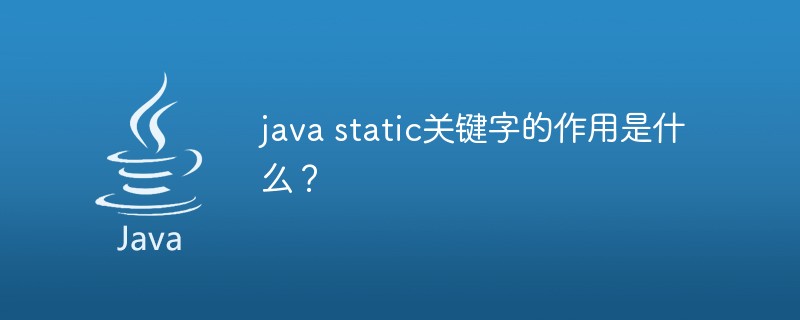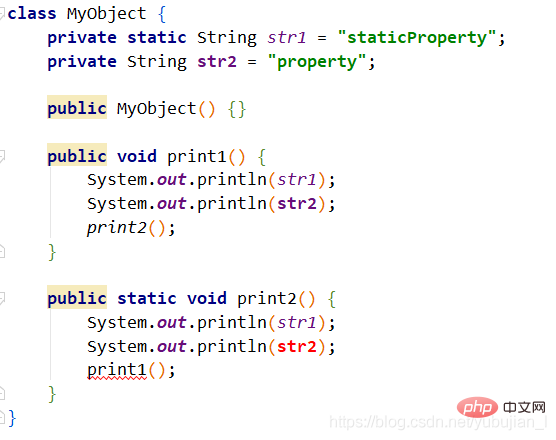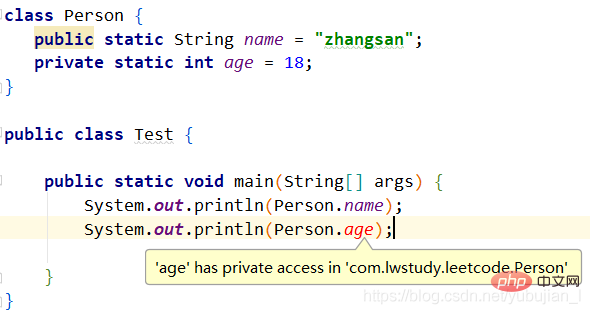What is the function of java static keyword?
In Java, static is a modifier, used to modify class member methods and class member variables. In addition, static code blocks can be written to optimize program performance; methods or variables modified by the static keyword are not It needs to rely on the object for access. As long as the class is loaded, it can be accessed through the class name.

(Recommended tutorial: java introductory tutorial)
1. Characteristics of the static keyword:
There is this passage on page P86 of "Java Programming Thoughts":
"A static method is a method without this. Non-static methods cannot be called inside a static method, and the reverse is possible. And You can call the static method only through the class itself without creating any objects. This is actually the main purpose of the static method."
Although this paragraph only explains the static method Special feature, but you can see the basic function of the static keyword. In short, the description in one sentence is:
It is convenient to call (method/variable) without creating an object.
Obviously, methods or variables modified by the static keyword do not need to rely on objects for access. As long as the class is loaded, it can be accessed through the class name.
static is a modifier used to modify class member methods and class member variables. In addition, static code blocks can be written to optimize program performance;
(Video tutorial recommendation: java video tutorial)
1. Static modified member method
Static modified methods are generally called static methods. Since static methods can be accessed without relying on any object, so for For static methods, there is no this, because it is not attached to any object. Since there is no object, there is no this. And due to this feature, non-static member variables and non-static member methods of the class cannot be accessed in static methods, because non-static member methods/variables must rely on specific objects before they can be called.
But it should be noted that although non-static member methods and non-static member variables cannot be accessed in static methods, static member methods/variables can be accessed in non-static member methods. For example:

#In the above code, since the print2 method exists independently of the object, it can be called directly with the class name.
If non-static methods/variables can be accessed in static methods, then if there is the following statement in the main method:
MyObject.print2();
At this time, there are no objects, and str2 does not exist at all, so a contradiction will occur. The same is true for methods. Since you cannot predict whether non-static member variables are accessed in the print1 method, accessing non-static member methods in static member methods is also prohibited.
For non-static member methods, there is obviously no restriction on accessing static member methods/variables.
Therefore, if you want to call a method without creating an object, you can set this method to static. Our most common static method is the main method. As for why the main method must be static, it is now clear. Because the program does not create any objects when executing the main method, it can only be accessed through the class name.
2. Static modified member variables
Static modified variables are also called static variables. The difference between static variables and non-static variables is that static variables are shared by all objects and there is only one in the memory. A copy that will be initialized if and only if the class is first loaded. Non-static variables are owned by objects and are initialized when the object is created. There are multiple copies, and the copies owned by each object do not affect each other.
The initialization order of static member variables is initialized in the order defined.
3. Static modified code block
Another important role of the static keyword is to form a static code block to optimize program performance. A static block can be placed anywhere in a class, and there can be multiple static blocks in a class. When a class is loaded for the first time, each static block will be executed in the order of the static blocks, and will only be executed once.
Static block can optimize program performance because of its characteristics: it will only be executed once when the class is loaded for the first time. As follows:
class Person{
private Date birthDate;
public Person(Date birthDate) {
this.birthDate = birthDate;
}
boolean isBornBoomer() {
Date startDate = Date.valueOf("1946");
Date endDate = Date.valueOf("1964");
return birthDate.compareTo(startDate)>=0 && birthDate.compareTo(endDate) < 0;
}
}isBornBoomer is used to determine whether a person was born between 1946 and 1964. Every time isBornBoomer is called, two objects, startDate and birthDate, will be generated, causing a waste of space. If you change It will be more efficient as follows:
class Person {
private Date birthDate;
private static Date startDate, endDate;
static {
startDate = Date.valueOf("1946");
endDate = Date.valueOf("1964");
}
public Person(Date birthDate) {
this.birthDate = birthDate;
}
boolean isBornBoomer() {
return birthDate.compareTo(startDate) >= 0 && birthDate.compareTo(endDate) < 0;
}
}Therefore, many initialization operations that only need to be performed once are placed in static code blocks.
二、static关键字的误区
1. 与C/C++中的static不同,Java中的static关键字不会影响到变量的变量或者方法的作用域。在Java中能够影响到访问权限的只有private、public、protected这几个关键字。示例如下:

提示错误,说明static关键字并不会改变变量和方法的访问权限。
2. 虽然对于静态方法来说没有this,但是我们在非静态方法中能够通过this访问静态方法成员变量。如下:
public class Test {
static int value = 11;
public static void main(String[] args) {
new Test().printValue();
}
private void printValue() {
int value = 22;
System.out.println(this.value);
}
}输出的结果是:11
这里的this表示的是当前对象,那么通过new Test()来调用printValue的话,当前对象就是通过new Test()生成的对象。而static变量是被对象所享有的,因此在printValue中的this.value的值毫无疑问是11。在printValue方法内部的value是局部变量,根本不可能与this关联,所以输出11。需要记住的是:静态成员变量虽然独立于对象,但是不代表不可以通过对象去访问,所有的静态方法和静态变量都可以通过对象访问(只要权限足够)。
3. 在C/C++中static关键字是可以作用于局部变量的,但是在Java中是不允许使用static修饰局部变量的。这是Java语法的规定。
更多编程相关知识,请访问:编程教学!!
The above is the detailed content of What is the function of java static keyword?. For more information, please follow other related articles on the PHP Chinese website!

Hot AI Tools

Undresser.AI Undress
AI-powered app for creating realistic nude photos

AI Clothes Remover
Online AI tool for removing clothes from photos.

Undress AI Tool
Undress images for free

Clothoff.io
AI clothes remover

Video Face Swap
Swap faces in any video effortlessly with our completely free AI face swap tool!

Hot Article

Hot Tools

Notepad++7.3.1
Easy-to-use and free code editor

SublimeText3 Chinese version
Chinese version, very easy to use

Zend Studio 13.0.1
Powerful PHP integrated development environment

Dreamweaver CS6
Visual web development tools

SublimeText3 Mac version
God-level code editing software (SublimeText3)

Hot Topics
 1386
1386
 52
52
 Perfect Number in Java
Aug 30, 2024 pm 04:28 PM
Perfect Number in Java
Aug 30, 2024 pm 04:28 PM
Guide to Perfect Number in Java. Here we discuss the Definition, How to check Perfect number in Java?, examples with code implementation.
 Weka in Java
Aug 30, 2024 pm 04:28 PM
Weka in Java
Aug 30, 2024 pm 04:28 PM
Guide to Weka in Java. Here we discuss the Introduction, how to use weka java, the type of platform, and advantages with examples.
 Smith Number in Java
Aug 30, 2024 pm 04:28 PM
Smith Number in Java
Aug 30, 2024 pm 04:28 PM
Guide to Smith Number in Java. Here we discuss the Definition, How to check smith number in Java? example with code implementation.
 Java Spring Interview Questions
Aug 30, 2024 pm 04:29 PM
Java Spring Interview Questions
Aug 30, 2024 pm 04:29 PM
In this article, we have kept the most asked Java Spring Interview Questions with their detailed answers. So that you can crack the interview.
 Break or return from Java 8 stream forEach?
Feb 07, 2025 pm 12:09 PM
Break or return from Java 8 stream forEach?
Feb 07, 2025 pm 12:09 PM
Java 8 introduces the Stream API, providing a powerful and expressive way to process data collections. However, a common question when using Stream is: How to break or return from a forEach operation? Traditional loops allow for early interruption or return, but Stream's forEach method does not directly support this method. This article will explain the reasons and explore alternative methods for implementing premature termination in Stream processing systems. Further reading: Java Stream API improvements Understand Stream forEach The forEach method is a terminal operation that performs one operation on each element in the Stream. Its design intention is
 TimeStamp to Date in Java
Aug 30, 2024 pm 04:28 PM
TimeStamp to Date in Java
Aug 30, 2024 pm 04:28 PM
Guide to TimeStamp to Date in Java. Here we also discuss the introduction and how to convert timestamp to date in java along with examples.
 Java Program to Find the Volume of Capsule
Feb 07, 2025 am 11:37 AM
Java Program to Find the Volume of Capsule
Feb 07, 2025 am 11:37 AM
Capsules are three-dimensional geometric figures, composed of a cylinder and a hemisphere at both ends. The volume of the capsule can be calculated by adding the volume of the cylinder and the volume of the hemisphere at both ends. This tutorial will discuss how to calculate the volume of a given capsule in Java using different methods. Capsule volume formula The formula for capsule volume is as follows: Capsule volume = Cylindrical volume Volume Two hemisphere volume in, r: The radius of the hemisphere. h: The height of the cylinder (excluding the hemisphere). Example 1 enter Radius = 5 units Height = 10 units Output Volume = 1570.8 cubic units explain Calculate volume using formula: Volume = π × r2 × h (4
 Create the Future: Java Programming for Absolute Beginners
Oct 13, 2024 pm 01:32 PM
Create the Future: Java Programming for Absolute Beginners
Oct 13, 2024 pm 01:32 PM
Java is a popular programming language that can be learned by both beginners and experienced developers. This tutorial starts with basic concepts and progresses through advanced topics. After installing the Java Development Kit, you can practice programming by creating a simple "Hello, World!" program. After you understand the code, use the command prompt to compile and run the program, and "Hello, World!" will be output on the console. Learning Java starts your programming journey, and as your mastery deepens, you can create more complex applications.




